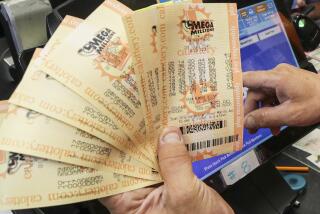State Lottery Bets on Keno Replacement
- Share via
SACRAMENTO — Hoping to recoup some of the revenue lost when the Supreme Court outlawed one of its most lucrative games, the California Lottery is preparing to introduce a new form of keno specifically designed to comply with the state Constitution, state officials said Thursday.
Created as a parimutuel game, the new keno game will no longer offer fixed prizes but will provide winnings that are based on a percentage of the total wagers placed on each game.
And to remove some of the cloud of illegality associated with keno, the lottery has decided to give the new game a different name. It will be called Hot Spot, a reference to its fast-paced style of play.
“Basically what the new game is is Super Lotto every five minutes,” lottery Director Maryanne Guilliard said. “It’s no longer a banked game, but completely a parimutuel game. I am comfortable . . . that it is legal.”
Lottery officials will formally present the proposal for the new game today to the five-member lottery commission and request its tentative approval. Officials say the game, which is expected to bring in $140 million a year, could be up and running in October.
In June, the lottery was forced to shut down its Nevada-style keno game after the California Supreme Court determined in a unanimous decision that it was illegal. The court said that keno, in effect, was a banked game rather than a lottery game because payoffs were determined by a fixed schedule instead of the pool of wagers.
As an outgrowth of the Supreme Court decision, the lottery moved a week later to close down its network of Scratcher vending machines. Officials said they were acting on advice of the attorney general’s office that the machines fit the legal definition of slot machines, which are illegal in California.
The shutdown of the keno game and the removal of Scratcher vending machines has cost the lottery millions of dollars in revenues.
Without the introduction of a new game, Guilliard estimated that the loss would reach $500 million by the end of the fiscal year in June 1997.
The revenue projections of $140 million a year for Hot Spot indicate that lottery officials do not expect the new game to be as popular as keno, which produced nearly $400 million in sales each year.
By law, lottery revenues are split three ways, with 50% dedicated to prizes, up to 16% to administrative costs and a minimum of 34% to public education. Any decrease in sales affects schools, which use lottery revenues for a variety of purposes.
Guilliard said final approval will be contingent on formal findings from the attorney general’s office on the game’s legality. She said the attorney general’s office has given preliminary approval for the game but asked for more time to study the proposed regulations that will govern it. She said a final decision from that office is expected Sept. 23.
“It is absolutely extremely important for the lottery to live within the law,” said Guilliard, who is a lawyer and may be the only lottery director in the country who keeps a copy of the state penal code on her desk.
She said she believed that the legal questions involving keno had “cast a shadow” over the lottery and she hoped that her attempts to ensure the legality of the new game would “be something very good for the lottery.”
Besides the scrutiny it receives from the attorney general, Guilliard also asked a law enforcement advisory committee composed of police chiefs, sheriffs and district attorneys to evaluate the new game. She said they have found it acceptable and they will appear before the commission today to present their report.
When keno was introduced, the lottery was criticized for its failure to consider objections from law enforcement. At the time, many sheriffs and police chiefs were concerned that it would encourage loitering around convenience stories and other places that offered the game. Their concerns proved to be unfounded.
The new game will be slightly different from its predecessor in that it will allow players to choose only two, three, four or five numbers from a field of 80. In the old game, players chose from one to 10 numbers from a field of 80.
A computer will randomly draw 20 numbers every five minutes. Each play will cost $1. Players determine if they are winners by matching their picks to the numbers drawn by the computer and displayed on a television monitor. Prizes are estimated to range from $25 to $500.
“Basically, we took the most popular parts of keno and offered those back to the players with parimutuel prizes,” said state lottery spokeswoman Jeanne Winnick.
Winnick said the Hot Spot game will be unique to California.
More to Read
Sign up for Essential California
The most important California stories and recommendations in your inbox every morning.
You may occasionally receive promotional content from the Los Angeles Times.













